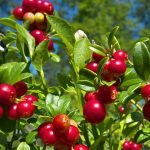In a reversal of the old maxim, “Monkeys see, monkeys do,” researchers in Uganda are trying to learn something new about healing by studying what chimpanzees eat when ill. It seems that chimps have an aptitude for self-medication, and in the wild, they choose medicinal plants effectively. A new research project sponsored by the Natural History Museum in Paris, France’s National Center for Scientific Research (CNRS) and the Uganda Wildlife Authority, hopes to find new healing molecules by tracking which plants chimps choose to heal various illnesses, and by then extracting the active chemical from the selected plants for use in newfangled pharmaceutical concoctions.
Already the research is bearing fruit — no pun intended. A chimp named “Yogi” was seen eating Aneilema aequinoctiale leaves in the morning and Albizia grandibracteata bark in the evening in order to cure his intestinal worms. Sure enough, lab tests later confirmed that those plants slay intestinal parasites. Then, according to Discovery News,” Another male chimpanzee, who had been feverish and weak, was observed eating only Trichilia rubescens leaves for a whole day.” Subsequent tests proved that the Trichilia leaves have molecules that act against malaria.
It certainly is remarkable that sickly chimps recognize medicinal plants and make wise choices when ill, as opposed to some of us humans who typically treat oncoming illness by reaching for comfort food — coffee, some pie, and a heap of macaroni and cheese.
But here’s the key point that the researchers missed: The report says that the sick chimp “ate only Trichilia Rebescens leaves for a whole day.” In other words, he fasted. He restricted his diet in order to heal. Yes, he also ingested healing plants, but his healing regimen consisted of several components — not just a single drug. The medical establishment ignores that fact, focusing only on observations that might lead to the creation of new, magic bullet drugs. This drug-happy focus might be influenced, of course, by the fact that the deal in this project includes a revenue-sharing clause for the research team in the event that a new drug is discovered.
And this points to the difference between the mainstream health establishment and the wisdom of the apes. It seems that the chimps are more holistic than the medical industry. We might be better served in this case if our physicians adopted the mantra: “Doctor see, Doctor do” — meaning that we would fare better if our physicians approached healing from a holistic point of view, like the chimps, rather than from just a drug-crazed, revenue-producing perspective.
:hc











